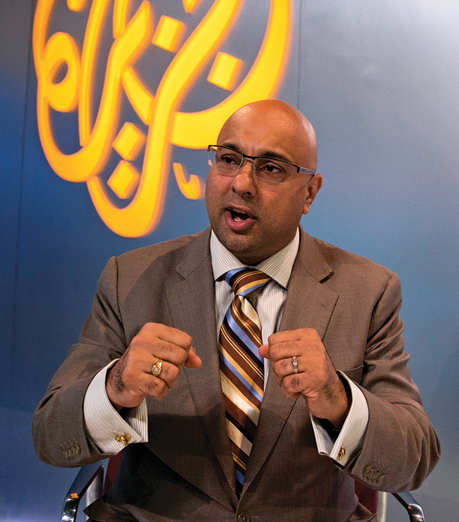
Later this month, Al Jazeera, the Qatar-based network, will launch Al Jazeera America, perhaps the most controversial move yet for a network known for being disruptive. Ali Velshi, the veteran TV anchor, left CNN earlier this year to become one of the new network’s most high-profile hires. Born in Kenya and raised in Toronto, Velshi got his start in journalism in Canada, working as a business anchor for CablePulse 24 and Citytv, before eventually becoming CNN’s chief business correspondent.
Q: You launch in just a few weeks. Are you nervous?
A: I’m not nervous. I’m excited. We are ready to go. And this is the longest I’ve been off air in my entire career.
Q: What have you been doing in your off-air time?
A: Well, most of it has been hiring staff. We hired about 900 people, which will make this one of the biggest news organizations anywhere.
Q: There’s been a lot of talk by new hires about how Al Jazeera America will be different—more representative of “Main Street,” more innovative. But at the level of daily operation, what does that mean?
A: It means that you don’t derive your stories from the traditional buckets. Your stories don’t start from a press release, or a statement from an elected official, or a CEO, or an analyst. They start with an idea: How can I tell this story with real people? We’re going to engage our viewership as a starting point. It’s harder to do that; it’s more time-consuming and more expensive. But that’s how we’re going to think about every story.
Q: Critics point out that Al Jazeera America has hired a lot of old hands from CNN, ABC, etc . Is that really a recipe for innovation?
A: We’ve had to hire up to 900 people, so we have some from ABC, CBS, CNN, NBC, from everywhere else that ever created a journalist, really. But everybody has been told: Don’t come in and do things the way you’re used to doing things.
Q: Do you worry about the lingering perception—which has roots in the Bush era—that Al Jazeera is somehow an anti-American network? [In 2009, then-defence secretary Donald Rumsfeld accused Al Jazeera of “promoting terrorism” by broadcasting footage of attacks by extremists in Iraq. The network was also criticized for broadcasting messages from then-al-Qaeda leader Osama bin Laden.]
A: I think lingering perceptions will be dealt with once we are on the air and people can experience the product and judge for themselves.
Q: In July, the Guardian writer Glenn Greenwald published an internal email from Al Jazeera host Marwan Bishara. It accuses Al Jazeera America of distancing itself from the parent network, in an effort to win over Americans with negative views of the Al Jazeera brand. How would you respond to that?
A: I actually responded by making my staff read the article, to understand that it’s healthy in a news organization to have that kind of discussion. Al Jazeera English is an established, award-winning news organization. But Al Jazeera America needs to appeal to an American audience, which consumes news differently. Al Jazeera understands that. Moreover, it’s not a given that, because you adapt to the market, you give up your principles. There is no danger that we’re going to become CNN or MSNBC or Fox.
Q: How do you think Americans consume news differently?
A: I think we—“we,” meaning the media—have generally caused Americans to consume news in smaller, less contextualized bites. I think we have sugar-coated the news. I think we have provided news that is consumable, at the expense of news that is more important. I think we have created a world in which extreme views push out moderate views.
Q: What you have essentially described is a dumbed-down American news milieu. Do you worry about why smarter news hasn’t been successful? It can’t just be that journalists haven’t thought to provide it .
A: There’s more money behind dumbing it down than there has been behind commercializing real news. We are going to put the resources behind commercializing real news. We are going to track those people who are NPR listeners, who watch BBC America. They exist. And we’re going after them with real resources.
The reason that dumbed-down news has prevailed is because there’s a lot of money in producing it. And it’s ubiquitous.
Q: Can it really just be a supply-side problem?
A: Gosh, if I could answer that question, I’d start my own network. I don’t know whether it’s a supply-side thing, or whether we’re in a place where people who want real information have turned away from television and cable, and what’s left are people who are prepared to watch cable-news candy.
Q: How did you feel about leaving CNN?
A: That was a hard decision. I was with CNN for 12 years. I love CNN. But this was an opportunity I couldn’t pass up. For one thing, Al Jazeera has a great editorial pedigree, which I’m really excited about. It will let me go further in-depth on stories, with documentaries and investigative pieces. At the same time, it’s a start-up, and I found that exciting.
Q: Looking back, what do you think CNN’s greatest weakness is, with respect to coverage?
A: It’s not about CNN specifically . . . The weakness of cable news is that it chases its audience around. Your audience wants fast-paced, popular news. It needs real news. Cable news changes its stripes based on audience reaction. Viewers are reacting well to breaking news? You probably do more breaking news than you need to. They’re reacting well to news about celebrities? You probably do more of that than you need to. The struggle is building something so that people will come to you, as opposed to constantly changing what you are because you’re unsure of where the audience is.
Q: You name BBC America as one of your models, in terms of target audience. But BBC America, with its heavy emphasis on foreign news, has not had the kind of ratings success that you envision for yourself. Will you be offering more international news than your competitors?
A: We will do more than our competitors, but I’m not putting BBC in that competitive set. We will be entirely focused on American news—with the required non-American news, for purposes of context.
Q: I’m going to ask you to imagine this situation. Two years from today, a royal baby sibling is born to Prince William and the duchess of Cambridge. How will Al Jazeera America cover that news in a smart way?
A: The beauty of TV is that it does not have to be live. In this case, rather than spending an hour or two hours staring at a door and waiting for somebody to come out, we can just tell you after it has happened. We are not going to be a network that is driven by live news, unless that live news is imperative. The birth of a royal baby is not imperative as live news.
Q: As a journalist, you came of age professionally in Canada. Do you think that has influenced your technique?
A: Yes, in fact. I think Canada has stayed true to its news roots better than the United States has, in many ways. So I think Al Jazeera America is going to look a lot like the news that Canadians are used to: longer stories, more investigation, deeper analysis, less partisan.
Q: Al Jazeera America, as you point out, will have hired about 900 journalists by launch time. But most outlets are scaling down. Imagine that you’re approached by a twentysomething, would-be journalist. Do you encourage him or her to get into the industry?
A: I am very careful not to wantonly encourage people to join my industry, or to aspire to work in TV. I am certain that, generally speaking, the wage pressure in the television news industry is downward. When I’m interviewing people, I ask them two or three times, ‘Is this really something you want?’ They have to know what they’re getting into.
Q: You were involved in politics when you were a student at Queen’s University, in Kingston, Ont. So be honest: When are you going to pull a Chrystia Freeland, drop everything, and run for Canadian political office?
A: (Laughs) When I’m smart enough to do so. Chrystia is brilliant and I love the fact that she’s done it. I think it’s a great thing that journalists find their way into politics. I love politics; it’s why I’m in the news. But I’ve got a lot to get under my belt before I do anything else.
Q: Will your belts—in addition to your signature three-piece suits—travel with you to Al Jazeera?
A: Absolutely, they will. Life should be all about change. But some things shouldn’t change. And my three-piece suits are one of those things.

